History of Freshwater Distance Races
Published on February 1st, 2016
by Craig Juel, Michigan City Yacht Club
After participating in the 2015 Super Mac sailboat race, I was curious about the history of the race, but unable to find the 40 year history documented. Over five months, with leads from many generous fellow sailors and an extensive search of online documents, yacht club records, book/magazine/newspaper archives, and many follow-up discussions, there is good supporting documentation for the following race history….
The Super Mac is a non-periodic 568 mile (about 500 nautical miles) sailboat race from Chicago, Illinois to Port Huron, Michigan, or vice versa. Recent editions have been jointly sponsored by the Chicago Yacht Club, Bayview Yacht Club and Port Huron Yacht Club. The 2015 race was promoted as “The Longest Fresh Water Race on Earth,” a debatable claim.
The race was originally known as the Centennial Race, then the Chicago-Sarnia International Yacht Race for several years, and the Millennium 600 before it was officially called the Super Mac. Although there are “Super Mac” references in newspapers dating back to 1983, the race wasn’t officially known as the Super Mac until the 2009 and 2015 editions. Start and finish locations, course and lengths, and sponsoring yacht clubs have varied over the 40 year history.
As of 2015, there have been 10 “Super Mac” sail races since 1975 of roughly 500 nautical miles. The “Super Mac” races have always followed immediately after the annual Chicago Race to Mackinac or the annual Bayview Mackinac Race. In Super Mac years:
• Boats participating in the Chicago Mac Race continued directly on to Port Huron, MI or Sarnia, ONT without stopping at the Chicago Mackinac Island finish line, or
• Boats participating in the Bayview Mac continued on to Chicago, IL without stopping at the Bayview Mackinac Island finish line.
Since 1939, the Chicago and Bayview Mackinac races have begun on Saturdays one week apart, Chicago first and then Bayview in odd years, and Bayview first then Chicago in even years.
The 289 nautical mile Chicago Race to Mackinac and the 300 nautical mile Lake Ontario 300 ‘Main Duck Course’ both claim the title of longest annual freshwater race. The Chicago race has the distinction of longest annual port-to-port race on Lake Michigan-Lake Huron from Chicago, Illinois to Mackinac Island, Michigan. The Ontario race is an out and back course beginning and ending at the Port Credit Yacht Club in Mississauga, Ontario on Lake Ontario.
The 338 nautical mile biennial Trans Superior International Yacht Race may also lay claim for longest race on the Great Lakes. The race starts in the vicinity of Gros Cap Light in Whitefish Bay, near Sault Ste. Marie, Michigan, and finishes near the entrance to the Duluth Ship Canal in Duluth, Minnesota.
The 500 nautical mile Super Mac has been publicized as the “longest freshwater race on earth” and it may be the longest freshwater race with a field of its size, with 30-50 boats competing. The Super Mac Notice of Race requires a minimum of 20 entries.
However, eight boats competed in a 600 nautical mile Lake Ontario 600, twice around the Lake Ontario 300 Main Duck Course, in 2014. The Lake Ontario 600 is scheduled again in 2016. And though often contested by four boats or less, there are several Great Lakes Singlehanded Society sponsored races ranging from 500 to 1034 nautical mile “Super Mac and Back” run in 2008, 2011, and 2014.
Photo: Hector J Marchand’s Dazzler, a J/41 that won the 1985 Super Mac. More images on Michigan City Yacht Club Facebook page.
Craig Juel is an offshore racing enthusiast from Michigan City Yacht Club, Michigan City, Indiana. He developed this story and it now is posted, with the winning records for each race, on Wikipedia. This article was republished from the February 2016 edition of Lake Michigan SuRF newsmagazine.


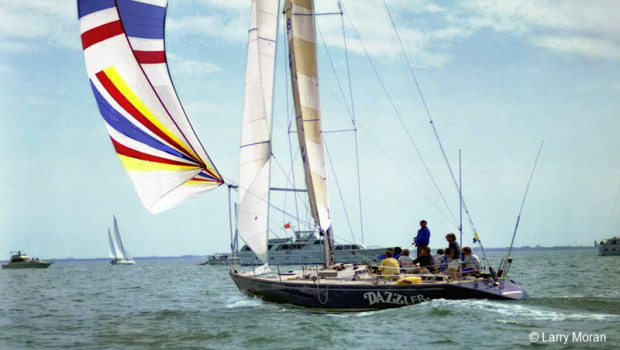


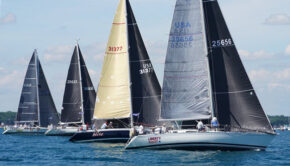
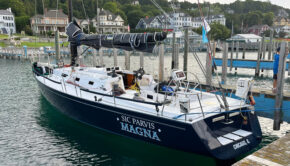
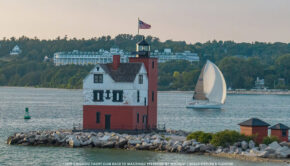
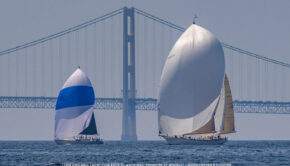
 We’ll keep your information safe.
We’ll keep your information safe.